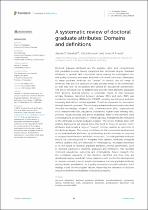A systematic review of doctoral graduate attributes: Domains and definitions
Abstract
Doctoral graduate attributes are the qualities, skills, and competencies that graduates possess, having completed their doctorate degree. Graduate attributes, in general, lack conceptual clarity, making the investigation into and quality assurance processes attached to doctoral outcomes challenging. As many graduate attributes are “unseen” or implicit, the full range of attributes that doctoral graduate actually possess needs to be synthesized, so that they may be recognized and utilized by educational stakeholders. The aim of this study was to establish and describe what attributes graduates from doctoral degrees possess. A systematic review of peer-reviewed, primary literature published between January 2016 and June 2021 was conducted, identifying 1668 articles. PRISMA reporting was followed, and after screening and full text critical appraisal, 35 articles remained for summation through thematic synthesis. The doctoral graduate attribute domains identified included knowledge, research skills, communication skills, organizational skills, interpersonal skills, reputation, scholarship, higher order thinking skills, personal resourcefulness, and active citizenship. Many of the domains were conceptualized as transferable or interdisciplinary, highlighting the relevance of the attributes doctoral graduates possess. The review findings align with existing frameworks yet extend those that tend to focus on generic “seen” attributes, and include a range of “unseen”, intrinsic qualities as outcomes of the doctoral degree. The review contributes to the conceptual development of doctoral graduate attributes, by synthesizing actual outcomes, as opposed mto prospective attributes or attributes-in-process. Doctoral graduate attributes should be conceptualized to integrate both generic attributes alongside intrinsic qualities that are important for employability. Increased awareness as to the scope of doctoral graduate attributes among stakeholders, such as doctoral supervisors, students, graduates and employers, may facilitate improved educational outcomes and employability. Future research into the contextual relevance of the domains identified and how they are developed may be beneficial. Future research could involve the development of context-relevant scales to empirically measure doctoral graduate attributes among alumni populations, as a quality assurance outcome indicator. Such findings could inform program reform, improving the relevance of doctoral education and the employability of doctoral graduates

